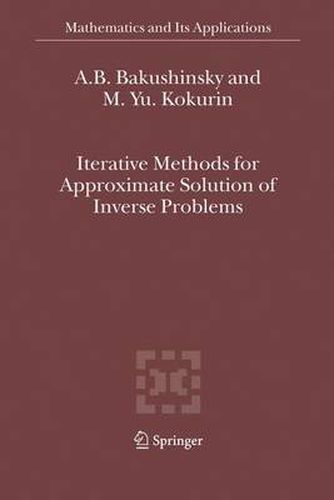Readings Newsletter
Become a Readings Member to make your shopping experience even easier.
Sign in or sign up for free!
You’re not far away from qualifying for FREE standard shipping within Australia
You’ve qualified for FREE standard shipping within Australia
The cart is loading…






This title is printed to order. This book may have been self-published. If so, we cannot guarantee the quality of the content. In the main most books will have gone through the editing process however some may not. We therefore suggest that you be aware of this before ordering this book. If in doubt check either the author or publisher’s details as we are unable to accept any returns unless they are faulty. Please contact us if you have any questions.
This volume presents a unified approach to constructing iterative methods for solving irregular operator equations and provides rigorous theoretical analysis for several classes of these methods. The analysis of methods includes convergence theorems as well as necessary and sufficient conditions for their convergence at a given rate. The principal groups of methods studied in the book are iterative processes based on the technique of universal linear approximations, stable gradient-type processes, and methods of stable continuous approximations. Compared to existing monographs and textbooks on ill-posed problems, the main distinguishing feature of the presented approach is that it doesn’t require any structural conditions on equations under consideration, except for standard smoothness conditions. This allows to obtain in a uniform style stable iterative methods applicable to wide classes of nonlinear inverse problems. Practical efficiency of suggested algorithms is illustrated in application to inverse problems of potential theory and acoustic scattering.
The volume can be read by anyone with a basic knowledge of functional analysis.
The book will be of interest to applied mathematicians and specialists in mathematical modeling and inverse problems.
$9.00 standard shipping within Australia
FREE standard shipping within Australia for orders over $100.00
Express & International shipping calculated at checkout
Stock availability can be subject to change without notice. We recommend calling the shop or contacting our online team to check availability of low stock items. Please see our Shopping Online page for more details.
This title is printed to order. This book may have been self-published. If so, we cannot guarantee the quality of the content. In the main most books will have gone through the editing process however some may not. We therefore suggest that you be aware of this before ordering this book. If in doubt check either the author or publisher’s details as we are unable to accept any returns unless they are faulty. Please contact us if you have any questions.
This volume presents a unified approach to constructing iterative methods for solving irregular operator equations and provides rigorous theoretical analysis for several classes of these methods. The analysis of methods includes convergence theorems as well as necessary and sufficient conditions for their convergence at a given rate. The principal groups of methods studied in the book are iterative processes based on the technique of universal linear approximations, stable gradient-type processes, and methods of stable continuous approximations. Compared to existing monographs and textbooks on ill-posed problems, the main distinguishing feature of the presented approach is that it doesn’t require any structural conditions on equations under consideration, except for standard smoothness conditions. This allows to obtain in a uniform style stable iterative methods applicable to wide classes of nonlinear inverse problems. Practical efficiency of suggested algorithms is illustrated in application to inverse problems of potential theory and acoustic scattering.
The volume can be read by anyone with a basic knowledge of functional analysis.
The book will be of interest to applied mathematicians and specialists in mathematical modeling and inverse problems.